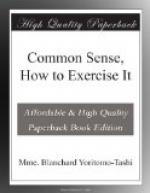“It is no longer the effort to conquer the impossible, which endeavor saps our vital forces; it is a contingency which study and common sense strip of all aleatory principles, in order to give a form which becomes more tangible and more definite every day.
“We have nothing more to do with sterile efforts toward gaining an object which fades from view and disappears as one approaches it.
“It is no longer the painful reaching out after an object always growing more indistinct as we draw near it.
“It is through conscious and unremitting effort that we attain the happy expression of successful endeavor and realize the best in life, for slow ascension in winning this best leaves no room for satiety in this noble strife.
“We must pity those who live for an illusion as well as those whose imagination has not known how to create an ideal, whose beauty illumines their efforts.
“It is the triumph of common sense to accomplish this transformation and to banish empty reveries, replacing them by creating a desire for the best, which each one can satisfy—without destroying it.
“The day when this purpose is accomplished, illusion, definitely conquered, will cease to haunt the mind of those whom common sense has illumined; vagaries will make place for reason and terrible disillusion will follow its chief (whose qualities never rise above mediocrity) into his retreat, and allow the flower of hope to blossom in the souls already filled with peace—that quality which is born of reason and common sense.”
LESSON III
THE DEVELOPMENT OF THE REASONING POWER
When reading certain passages in the manuscripts of Yoritomo, one is forcibly reminded of the familiar phrase: “Nothing is definitely finished among men, for each thing stops only to begin again.”
He says, “That many centuries before the great minds constructed altars to the goddess of Reason, they were in search of a divinity to replace the one they had just destroyed.
“If it were proposed to me to build temples which would synthesize my devotion with certain sentiments, my desire would be that those dedicated to the Will and to Reason should dominate all others, for then they would be under the protection of powers for good.”
In a few pages further on he insists again and again upon the necessity of developing the worship of reason.
“Reasoning,” he continues, “is a divinity, around which gravitate a whole world of gods, important but inferior to it.
“Among this people of these idols, so justly revered, there is one god which occupies a place apart from the others.
“This god is Common Sense, which gave birth to Reason, and has always been its faithful companion.
“It is, in reality, the controlling force exercising its power to guard reason against the predominating character and nefarious tendencies created by self-interest.




